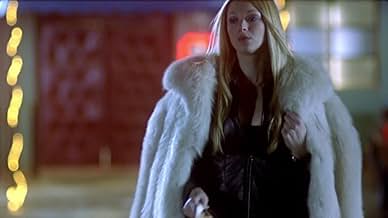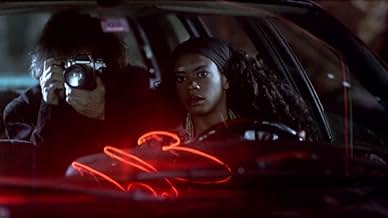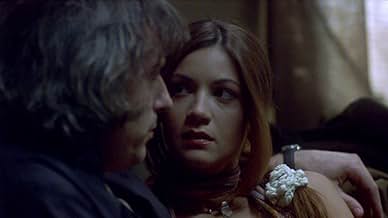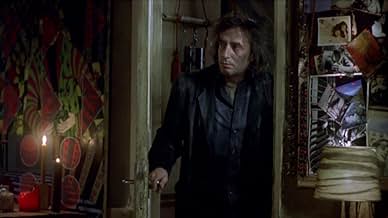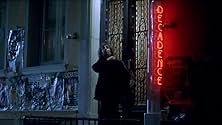O hamenos ta pairnei ola
- 2002
- 2h 1min
VALUTAZIONE IMDb
6,7/10
1452
LA TUA VALUTAZIONE
Aggiungi una trama nella tua linguaA cynical man, along with a 19 year old musician, a former lover, an alcoholic client of a bar and a black strip club dancer are involved with anarchist mood in a dangerous game with drugs g... Leggi tuttoA cynical man, along with a 19 year old musician, a former lover, an alcoholic client of a bar and a black strip club dancer are involved with anarchist mood in a dangerous game with drugs godfathers of the night, cops and media.A cynical man, along with a 19 year old musician, a former lover, an alcoholic client of a bar and a black strip club dancer are involved with anarchist mood in a dangerous game with drugs godfathers of the night, cops and media.
- Premi
- 2 vittorie totali
Themis Katz
- Dealer #2
- (as Themis Katsimihas)
Trama
Lo sapevi?
- ConnessioniFeatured in Directing Hell (2011)
- Colonne sonoreIt's a Wonderful World
Written by Simeon Nikolaidis
Recensione in evidenza
The late Nikos Nikolaidis, who I'm sure like Ken Russell will someday be belatedly elevated by film historians to the pantheon of greatest cinematic stylists, falters in his penultimate film LOSER TAKES ALL, arresting in early reels visually but ultimately falling apart due to gross sentimentality and over-reliance on cliché & in-joking. For budding filmmakers it serves as an object lesson that nihilism and sentimentality don't mix.
One IMDb-er invoked Jim Jarmusch as a reference point, which I find off-point but useful nonetheless. That is because Nikolaidis fell victim, like Jarmusch and so many other promising directors (Greenaway, the Kaurismakis, Abel Ferrara; name your own poison) to what I term Filmfestival-itis. As a journalist in the '80s I covered film fests and studied their history, back to pioneering Venice and the tourist-attraction known as Cannes (created to attract folks in the off-season to the fabulous Riviera town).
What was once an important phenomenon, say in the '50s and '60s, for discovering talent, creating early-warning-buzz, crystallizing critical opinion and serving as international markets for the buying & selling of film distribution rights, these festivals have proliferated in recent decades to the point of absurdity. Here in NYC, the De Niro-inspired TriBeCa Film Festival, a response to 9/11, has a nearly unrivaled track record of screening thousands of awful movies making it useful, as critics like Rex Reed were laughingly referred to back when, as an inverse barometer of a film's worth -if it was shown at TriBeCa it should be avoided.
For Nikolaidis and an increasing number of filmmakers, festival coverage no longer promotes or introduces a film but rather eats up its potential audience - the filmmaker trading eyeballs for truly paying customers at commercial cinemas. Sure, there are ancillary benefits with video deals, pay-cable and now streaming or VOD exposure, but festival screenings turn out to be the elephants' graveyard for many titles, benefiting the fest's local economy (and backers/staff) but more of a loss leader for a big local party than honest film exhibition as we once knew it before the industry's tail started wagging the dog in the Video Era.
Worse yet is the pernicious effect of pandering to the gatekeepers of the festival circuit, many of whose ancestors I knew back in the '80s -the head honchos at Berlin, Sundance, Edinburgh, etc. A certain type of film catches on with these elites and their sycophants in what remains of the "film critic" world (now a job position as obsolete as "travel agent"). What they like is what they get, accounting for the clichéd nature of so many national cinemas that supply fodder for fests. For example I recall the quirky British stereotypical comedies made in the wake of GREGORY'S GIRL's success over 3 decades back, and still with us today, or the dull results of the "indie" movement of the '80s.
LOSER TAKES ALL falls into this rut, opening with beautiful atmospherics and overt (but in color) homage to film noir, right down to a Raoul Walsh WHITE HEAT poster prominently displayed. But unfortunately we don't have Boetticher, Fuller, Walsh, Siodmak and N. Ray as our heroes any more. Instead Nikos begins with tedious Abel Ferrara clichés and quickly segues to almost a parody of the Aki Kaurismaki ironic approach to cinema: the no-good heroes & heroines, drinking beer, making dumb witticisms or in this case allegorical references as small-talk, and putting up competing cynical world-views while deep-down harboring the most sentimental notions of heroism and camaraderie.
Our hero, rock-musician in real life turned lead actor (and not a good one at that) is certainly out of the Kaurismaki Bros. Game book, and his rottenness (stealing the ring off the finger of the dead mother of another lead character) to comically pawn or idle rape is just a grinning hipness hiding the film's maudlin central heartbeat.
Certain elements remain relevant: the hero's Luddite philosophy is almost poignant (he rejects a cell phone for example) now that the war against rampaging technology has been lost; his insistence on drachmas instead of those horrible Euros is the source of unintended black humor given Greece's on-going fiscal crisis; and the persistent "We gotta get out of this place" theme is still a powerful if overdone message for those of us who came of age in the '60s.
The movie's many crucial faults include a cavalier attitude towards characters, most notably the comic relief drunken beauty who keeps throwing up on the main actress referred to as Black Beauty (Louise Attah, often speaking in English), and the irritating and predictable use of the Leonard Cohen figure (singing his own mournful ballads in English throughout) guitarist whose sentimental end was bad fimmaking at its worst. Similarly, the stunning shots in the first reel are followed by tiresome, poorly staged confrontations in the rest of the film that even crappy action movie directors execute far better than Nikos. Our impervious hero shooting off his gun randomly at baddies is ridiculous on all levels and killed off my involvement in the ongoing story.
One IMDb-er invoked Jim Jarmusch as a reference point, which I find off-point but useful nonetheless. That is because Nikolaidis fell victim, like Jarmusch and so many other promising directors (Greenaway, the Kaurismakis, Abel Ferrara; name your own poison) to what I term Filmfestival-itis. As a journalist in the '80s I covered film fests and studied their history, back to pioneering Venice and the tourist-attraction known as Cannes (created to attract folks in the off-season to the fabulous Riviera town).
What was once an important phenomenon, say in the '50s and '60s, for discovering talent, creating early-warning-buzz, crystallizing critical opinion and serving as international markets for the buying & selling of film distribution rights, these festivals have proliferated in recent decades to the point of absurdity. Here in NYC, the De Niro-inspired TriBeCa Film Festival, a response to 9/11, has a nearly unrivaled track record of screening thousands of awful movies making it useful, as critics like Rex Reed were laughingly referred to back when, as an inverse barometer of a film's worth -if it was shown at TriBeCa it should be avoided.
For Nikolaidis and an increasing number of filmmakers, festival coverage no longer promotes or introduces a film but rather eats up its potential audience - the filmmaker trading eyeballs for truly paying customers at commercial cinemas. Sure, there are ancillary benefits with video deals, pay-cable and now streaming or VOD exposure, but festival screenings turn out to be the elephants' graveyard for many titles, benefiting the fest's local economy (and backers/staff) but more of a loss leader for a big local party than honest film exhibition as we once knew it before the industry's tail started wagging the dog in the Video Era.
Worse yet is the pernicious effect of pandering to the gatekeepers of the festival circuit, many of whose ancestors I knew back in the '80s -the head honchos at Berlin, Sundance, Edinburgh, etc. A certain type of film catches on with these elites and their sycophants in what remains of the "film critic" world (now a job position as obsolete as "travel agent"). What they like is what they get, accounting for the clichéd nature of so many national cinemas that supply fodder for fests. For example I recall the quirky British stereotypical comedies made in the wake of GREGORY'S GIRL's success over 3 decades back, and still with us today, or the dull results of the "indie" movement of the '80s.
LOSER TAKES ALL falls into this rut, opening with beautiful atmospherics and overt (but in color) homage to film noir, right down to a Raoul Walsh WHITE HEAT poster prominently displayed. But unfortunately we don't have Boetticher, Fuller, Walsh, Siodmak and N. Ray as our heroes any more. Instead Nikos begins with tedious Abel Ferrara clichés and quickly segues to almost a parody of the Aki Kaurismaki ironic approach to cinema: the no-good heroes & heroines, drinking beer, making dumb witticisms or in this case allegorical references as small-talk, and putting up competing cynical world-views while deep-down harboring the most sentimental notions of heroism and camaraderie.
Our hero, rock-musician in real life turned lead actor (and not a good one at that) is certainly out of the Kaurismaki Bros. Game book, and his rottenness (stealing the ring off the finger of the dead mother of another lead character) to comically pawn or idle rape is just a grinning hipness hiding the film's maudlin central heartbeat.
Certain elements remain relevant: the hero's Luddite philosophy is almost poignant (he rejects a cell phone for example) now that the war against rampaging technology has been lost; his insistence on drachmas instead of those horrible Euros is the source of unintended black humor given Greece's on-going fiscal crisis; and the persistent "We gotta get out of this place" theme is still a powerful if overdone message for those of us who came of age in the '60s.
The movie's many crucial faults include a cavalier attitude towards characters, most notably the comic relief drunken beauty who keeps throwing up on the main actress referred to as Black Beauty (Louise Attah, often speaking in English), and the irritating and predictable use of the Leonard Cohen figure (singing his own mournful ballads in English throughout) guitarist whose sentimental end was bad fimmaking at its worst. Similarly, the stunning shots in the first reel are followed by tiresome, poorly staged confrontations in the rest of the film that even crappy action movie directors execute far better than Nikos. Our impervious hero shooting off his gun randomly at baddies is ridiculous on all levels and killed off my involvement in the ongoing story.
I più visti
Accedi per valutare e creare un elenco di titoli salvati per ottenere consigli personalizzati
- How long is Loser Takes All?Powered by Alexa
Dettagli
Contribuisci a questa pagina
Suggerisci una modifica o aggiungi i contenuti mancanti

Divario superiore
By what name was O hamenos ta pairnei ola (2002) officially released in Canada in English?
Rispondi
